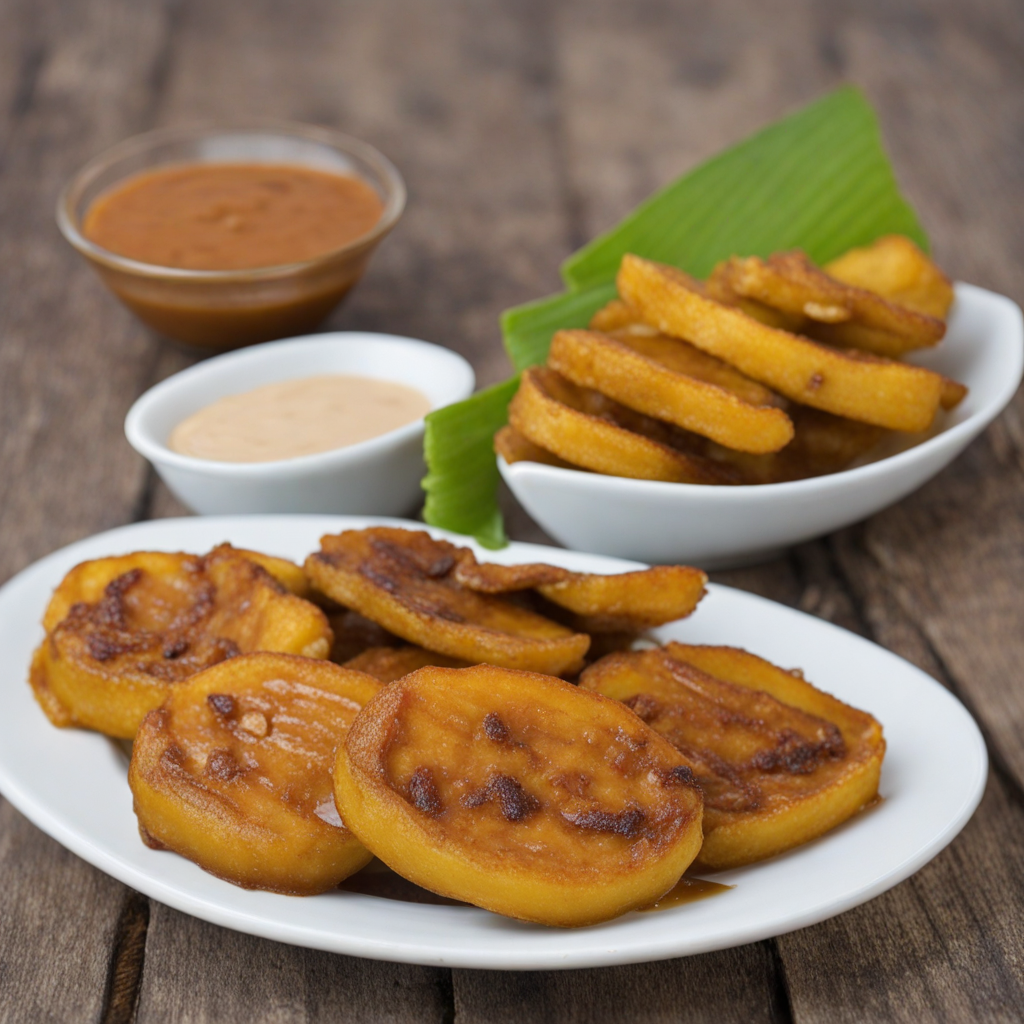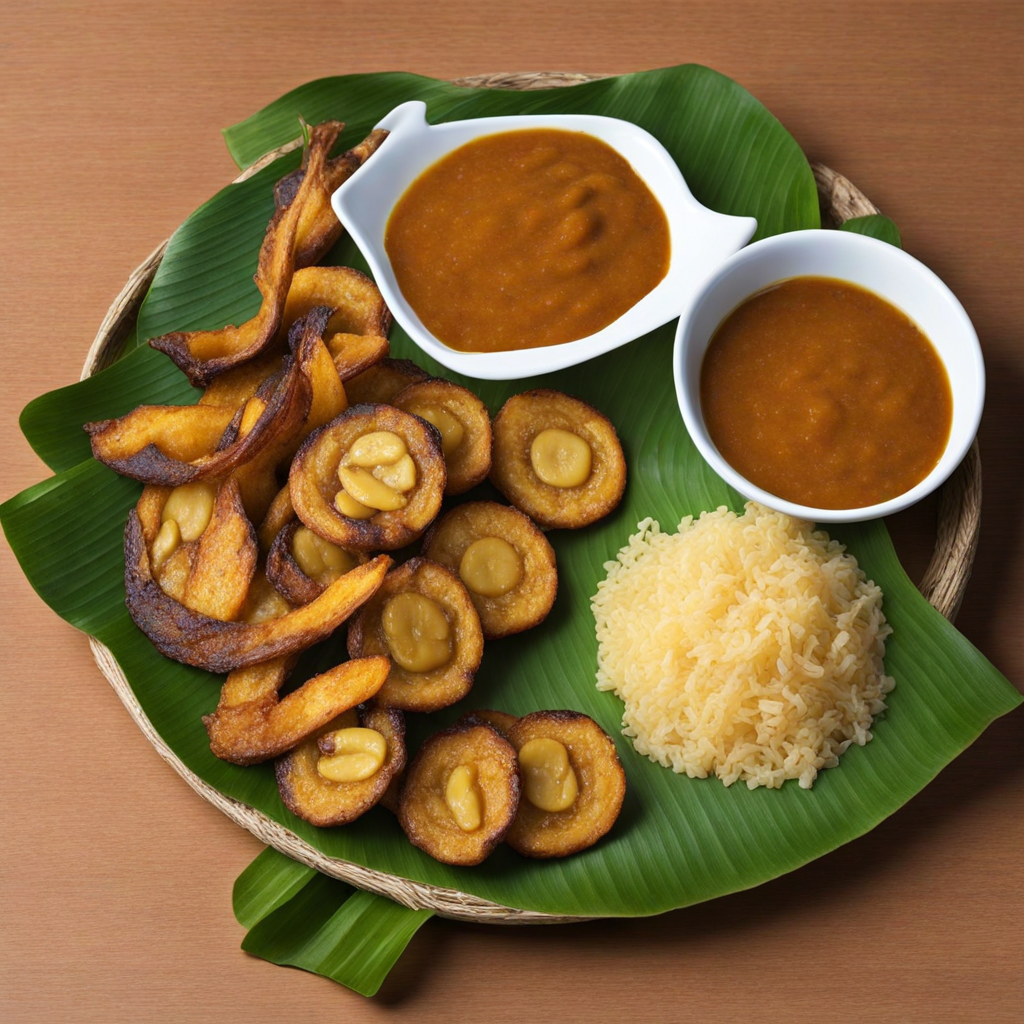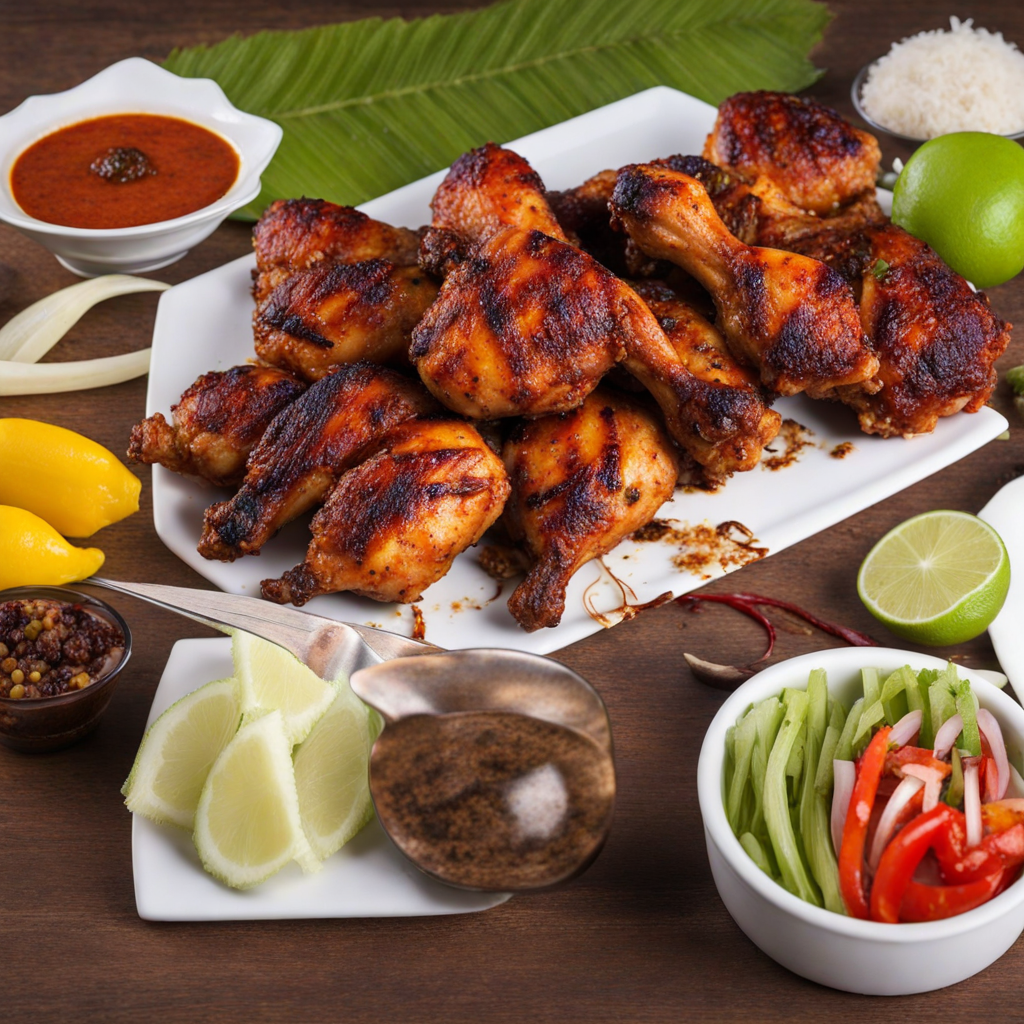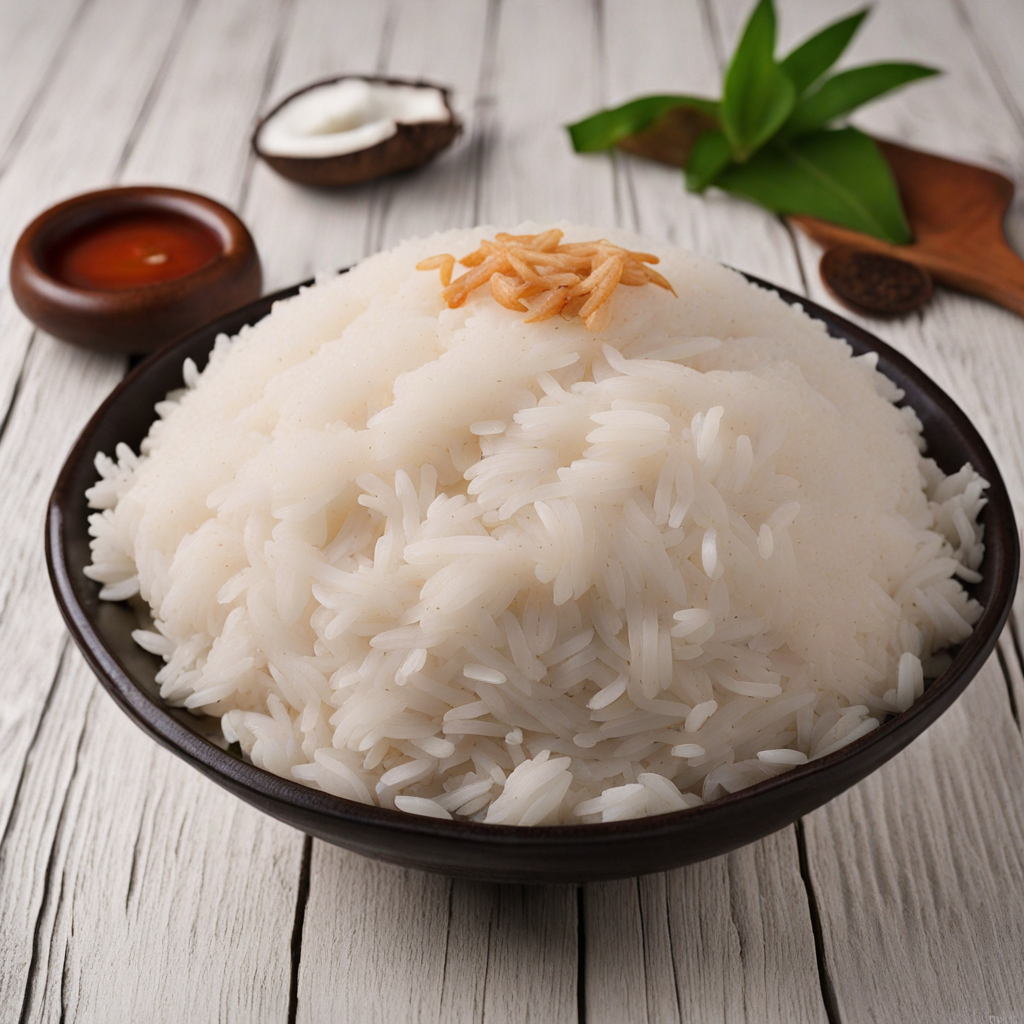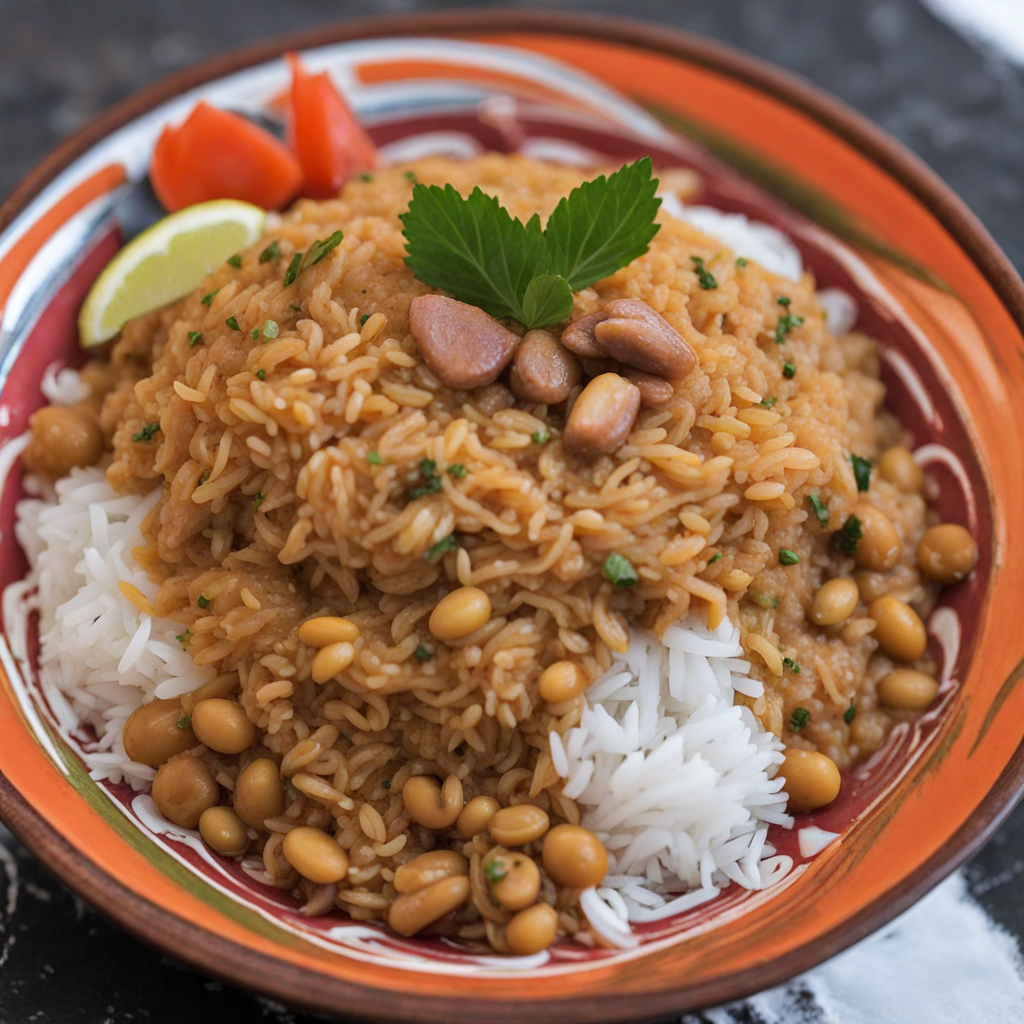Bakabana
Bakabana is a delightful Surinamese dish that showcases the rich culinary heritage of the region. This savory treat consists of ripe plantains that are sliced and then deep-fried to golden perfection. The process enhances the natural sweetness of the plantains while providing a crispy exterior that contrasts beautifully with the soft, tender interior. Often enjoyed as a snack or side dish, Bakabana is a beloved comfort food that embodies the vibrant flavors of the Caribbean. The preparation of Bakabana is simple yet rewarding, making it accessible for both novice and experienced cooks. The plantains are typically peeled and cut into thick slices before being fried until they achieve a desirable crunch. In some variations, they are seasoned with a sprinkle of salt or served with a dipping sauce, adding an extra layer of flavor. The aroma of frying plantains fills the air, inviting anyone nearby to indulge in this irresistible delicacy. Serving Bakabana is often accompanied by a side of spicy dipping sauce or a tangy salsa, which complements the sweetness of the plantains. The dish can be enjoyed on its own or paired with other traditional Surinamese meals, making it a versatile addition to any dining experience. With its unique combination of textures and flavors, Bakabana is a must-try for anyone looking to explore the delicious and diverse world of Surinamese cuisine.
How It Became This Dish
The History of Bakabana: A Surinamese Delight Origins: The Roots of Bakabana Bakabana, a beloved snack in Suriname, is a deliciously simple dish made from ripe plantains, typically fried until golden and crispy. Its name derives from the Arawak word for "plantain," reflecting the deep historical and cultural connections between the indigenous peoples of the region and the food they cultivated. Plantains, a staple in many tropical regions, have been cultivated in Suriname for centuries, brought over by early explorers and traders. The origins of Bakabana can be traced back to the indigenous peoples of Suriname, who utilized local resources to create nourishing meals. The Arawak and Carib tribes, among others, harvested plantains and prepared them in various ways, including steaming, baking, and frying. These early culinary practices laid the groundwork for what would evolve into the Bakabana we know today. Colonial Influences: The Melting Pot of Flavors Suriname's colonial history profoundly influenced its cuisine, including Bakabana. In the 17th century, the Dutch colonized the region, bringing with them enslaved Africans, who further enriched Surinamese culinary traditions. The fusion of indigenous, African, and later, Asian influences, particularly from Indian and Javanese communities, created a vibrant tapestry of flavors. Enslaved Africans introduced techniques such as deep frying and spicing, which enhanced the preparation of Bakabana. They often paired the fried plantains with various sauces and seasonings, infusing the dish with a distinctive taste that resonated with the local palate. Over time, Bakabana became not just a snack but a symbol of resilience and cultural heritage, embodying the spirit of a diverse population. Cultural Significance: More Than Just a Snack Bakabana holds a special place in Surinamese culture. It is not merely a culinary delight; it is a cultural emblem that reflects the country's rich history of migration, survival, and adaptation. The dish is commonly enjoyed as a street food, often sold by vendors at markets, festivals, and social gatherings, making it a communal experience. In Suriname, food is a central part of social life, and Bakabana is often shared among friends and family. It is a popular choice during celebrations, family gatherings, and holidays, symbolizing togetherness and joy. The act of sharing Bakabana can be seen as a reflection of Suriname's diverse social fabric, where people from various backgrounds come together, united by their love for this simple yet flavorful dish. Additionally, Bakabana has become emblematic of Surinamese identity. As the country navigated its post-colonial era, there was a conscious effort to reclaim and celebrate local traditions, and Bakabana emerged as a quintessential dish that encapsulated the country’s culinary heritage. It is often featured in national and international events that promote Surinamese culture, showcasing the dish as a point of pride for its people. Development Over Time: Evolution of Bakabana As Suriname's culinary scene evolved, so too did Bakabana. In its traditional form, bakabana is made by slicing ripe plantains and frying them until crispy. However, modern interpretations have emerged, incorporating new ingredients and techniques. Some vendors and home cooks have started to experiment with flavors, adding spices, herbs, or even cheese to the mix, creating variations that appeal to contemporary tastes while retaining the essence of the original dish. The rise of globalization and the migration of Surinamese communities abroad have also influenced the evolution of Bakabana. In countries with significant Surinamese populations, such as the Netherlands and France, Bakabana has been embraced and adapted, often served as a part of a diverse menu that reflects the rich culinary heritage of Suriname. The dish has found its way into restaurants and food festivals, allowing new audiences to experience its delightful crunch and sweet flavor. Moreover, the increasing awareness of plant-based diets and the health benefits associated with plantains have given Bakabana a renewed relevance. As more people seek healthier snack options, Bakabana is often seen as a wholesome alternative to conventional fried snacks, making it an attractive choice for health-conscious consumers. Conclusion: The Enduring Appeal of Bakabana Today, Bakabana stands as a testament to Suriname's rich culinary history, a dish that carries the weight of its past while adapting to the needs of the present. Its journey from indigenous roots to a contemporary snack reflects the resilience and creativity of the Surinamese people, who have continually embraced their diverse heritage. Whether enjoyed at a bustling street market, at a family gathering, or in the comfort of one’s home, Bakabana remains a cherished part of Surinamese culture. It invites everyone to partake in a shared experience, bridging generations and backgrounds through the simple act of enjoying a delicious snack. As Suriname continues to evolve, Bakabana will undoubtedly remain a staple, a delicious symbol of identity, community, and culinary tradition that resonates with both locals and those fortunate enough to experience its delightful taste.
You may like
Discover local flavors from Suriname


